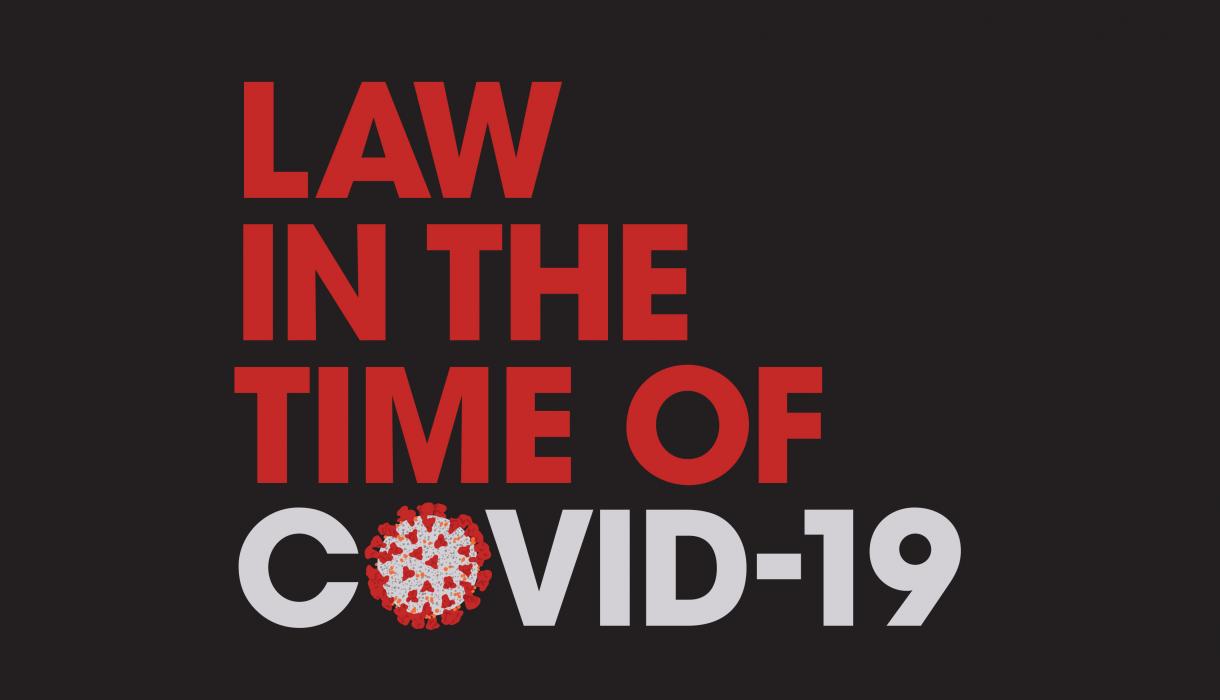Law in the Time of COVID-19
The free e-book, published on April 20, features contributions by 18 Columbia Law scholars and delves into the legal issues around COVID-19—including elections, privacy, prisoners’ rights, bankruptcy, the environment, force majeure in contracts, and public health law.

On March 11, 2020, the World Health Organization declared COVID-19 a pandemic; the same day, Columbia Law School began the process of moving its entire curriculum online. As faculty and students adjusted to the new normal, they also mobilized to help individuals and communities address new and urgent legal problems resulting from the pandemic.
Law in the Time of COVID-19 features essays by legal scholars that offer insights for thinking about and tackling related emerging issues. Conceived of and spearheaded by Katharina Pistor, Edwin B. Parker Professor of Comparative Law and director of the Center on Global Legal Transformation, the book was produced in only a few weeks. As Pistor explains in her introduction, the publication is meant to serve as a useful reference, not an academic treatise. “This volume was put together quickly; it is a response to what we perceived to be an urgent need for more legal information and analysis in the midst of the COVID-19 pandemic.”
Read or download the free e-book. Learn more about the topics covered:
Human Rights Under Strain
How can at-risk populations—including immigrants, incarcerated individuals, and those who work in correctional facilities—be protected, and what policies or actions can we take to ensure their rights are upheld? Essays include:
“COVID-19 and Prisoners’ Rights”
Gregory Bernstein, Stephanie Guzman, Maggie Hadley, Rosalyn M. Huff, Alison Hung, and Anita N.H. Yandle, with Alexis Hoag and Bernard E. Harcourt
“Linked Fate: Justice and the Criminal Legal System During the COVID-19 Pandemic”
Susan Sturm, Faiz Pirani, Hyun Kim, Natalie Behr, and Zachary D. Hardwick
“Immigration in the Time of COVID-19”
Wadhia Shoba
Public Life and Social Welfare
From elections to public health and child welfare, the COVID-19 crisis is testing established systems and institutions that safeguard individuals and our society. What measures can we take to ensure protections are upheld, and how can we use this as an opportunity to fix broken systems? Essays include:
“COVID-19 and the Law: Elections”
Richard Briffault
“The New “Essential”: Rethinking Social Goods in the Wake of COVID-19”
Olatunde Johnson
“Public Health Law Tools: A Brief Guide”
Kristen Underhill
“Child Welfare and COVID-19: An Unexpected Opportunity for Systemic Change”
Jane Spinak
“Emergency Exemptions from Environmental Laws”
Michael Gerrard
Private Life
While collecting data can be used to aid the health crisis, such as by tracking those who are sick, how might it also create an opportunity for governments to institute wider surveillance practices? And what legal and health risks are LGBTQ+ people facing during this epidemic? Essays include:
“Privacy and Pandemics”
Clarisa Long
“COVID-19 and LGBT Rights”
Suzanne Goldberg
The Economy Under Lockdown
What are the new best practices for managing the economic fallout for various sectors of the economy, such as small businesses, and how can we enhance existing tools and methodologies to better manage disputes, bankruptcy, and even everyday payment transactions? Essays include:
“How to Help Small Businesses Survive COVID-19”
Todd Baker and Kathryn Judge
“Bankruptcy’s Role in the COVID-19 Crisis”
Edward R. Morrison and Andrea C. Saavedra
“COVID-19 as a Force Majeure in Corporate Transactions”
Matthew Jennejohn, Julian Nyarko, and Eric Talley
“A Comparative Perspective on Commercial Contracts and the Impact of Covid-19–Change of Circumstances, Force Majeure, or What?”
Christian Twigg-Flesner
“Dispute Resolution in Pandemic Circumstances”
George Bermann
“Driver for Contactless Payments”
Ronald Mann